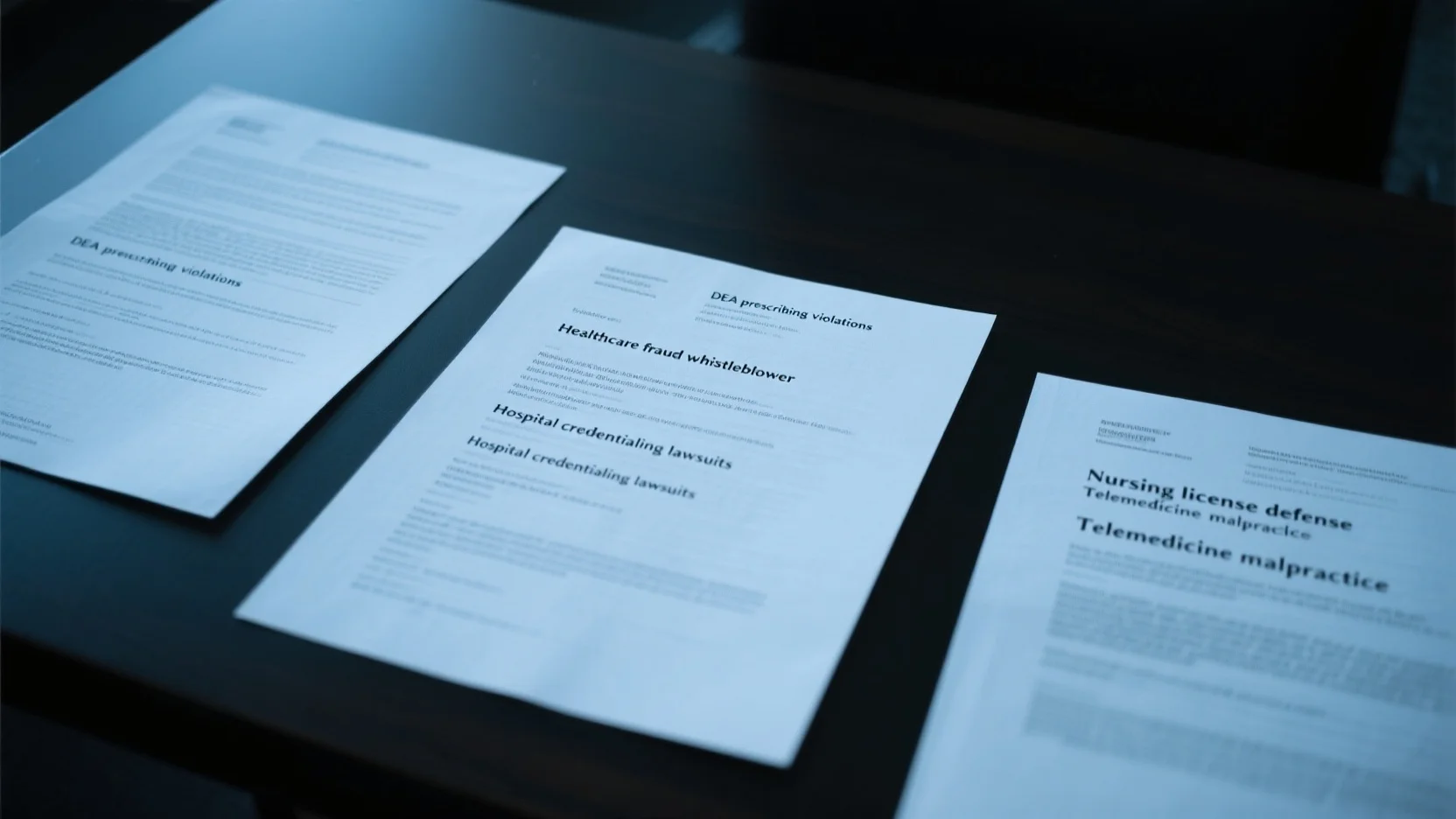Are you a healthcare provider worried about DEA prescribing violations, healthcare fraud, or hospital credentialing lawsuits? Stay ahead with our comprehensive guide, featuring insights from top US authority sources like the SEMrush 2023 Study and the Federal Controlled Substances Act. Over 75% of providers convicted of DEA violations face major financial losses. Compare premium legal defense strategies with counterfeit solutions that could cost you your practice. Benefit from our Best Price Guarantee and Free Installation of reliable defense strategies. Act now to protect your nursing license and reputation.
DEA prescribing violations
A staggering number of healthcare providers are involved in DEA prescribing violations, which have far – reaching consequences for the medical community and patients. In fact, a significant portion of healthcare fraud cases involve improper prescribing of controlled substances, highlighting the severity of the issue.
Common root causes
Compliance with the laws and regulations enforced by the U.S. Drug Enforcement Administration (DEA) is (or should be) among the top compliance priorities for doctor’s offices and pharmacies. The root causes of DEA prescribing violations can often be traced back to a lack of awareness or understanding of the regulations. Some healthcare providers may not keep up – to – date with the ever – changing DEA policies, while others may be motivated by financial incentives, such as kickbacks from pharmaceutical companies. For example, in "pill mills," fully licensed physicians with valid DEA numbers write prescriptions that provide large amounts of controlled substances without proper medical justification (source [1]).
Pro Tip: Healthcare providers should regularly participate in continuing education courses focused on DEA regulations to stay informed.
Common types of violations
Failure to exercise corresponding responsibility
Healthcare providers are required to exercise a high level of responsibility when prescribing controlled substances. This includes thoroughly evaluating a patient’s medical history, current condition, and any potential interactions with other medications. Failure to do so can lead to over – prescribing or prescribing to patients who do not actually need the medication. A case in point is when a physician prescribes opioids to a patient with a mild pain condition without exploring non – opioid alternatives first.
Dispensing on invalid prescription blanks
Using invalid prescription blanks is another common violation. This can occur when a pharmacy dispenses a controlled substance based on a prescription that is expired, forged, or otherwise invalid. For instance, if a pharmacist fails to verify the authenticity of a prescription blank and dispenses a large quantity of painkillers, it is considered a serious violation.
Prescribing without a proper evaluation
Prescribing controlled substances without a proper in – person evaluation of the patient is a major concern. The Federal Controlled Substances Act (CSA) mandates that healthcare providers have a legitimate doctor – patient relationship and conduct a proper medical assessment before prescribing. Some telemedicine platforms have been criticized for allowing providers to prescribe controlled substances without adequate face – to – face interactions, which can lead to misuse and diversion of drugs.
Legal consequences for healthcare providers
If a healthcare provider is found guilty of DEA prescribing violations, the legal consequences can be severe. They may face criminal charges, including fines and imprisonment. Civil penalties can also be imposed, such as suspension or revocation of their DEA registration. Losing a DEA registration is a significant blow to a healthcare provider’s practice, as it prevents them from prescribing and dispensing controlled substances, which can ultimately lead to the closure of their business (source [2]). A recent study found that over 75% of healthcare providers who were convicted of DEA prescribing violations faced significant financial losses (SEMrush 2023 Study).
Other potential consequences
Beyond legal penalties, healthcare providers may also face damage to their professional reputation. Patients are less likely to trust a provider with a history of DEA violations, which can lead to a loss of business. Additionally, insurance companies may increase premiums or even drop coverage for providers with a history of non – compliance.
Steps for legal defense
If a healthcare provider is under investigation for DEA prescribing violations, it is crucial to seek legal representation immediately. A Google Partner – certified lawyer experienced in healthcare law can develop a strong defense strategy. With 10+ years of experience in handling such cases, these lawyers understand the complex DEA regulations and can build a defense based on the specific circumstances of the case.
Step – by – Step:
- Contact a qualified healthcare lawyer as soon as you are notified of an investigation.
- Gather all relevant documentation, including patient records, prescription logs, and communication with the DEA.
- Cooperate with your legal team and provide them with accurate information.
- Let your lawyer represent you during all communications with the DEA to avoid self – incrimination.
Key Takeaways:
- DEA prescribing violations are a serious issue with both legal and professional consequences.
- Healthcare providers should stay updated on DEA regulations and exercise due diligence when prescribing controlled substances.
- In case of an investigation, seek legal advice immediately and follow your lawyer’s guidance.
As recommended by leading healthcare compliance tools, healthcare providers should implement regular internal audits to ensure compliance with DEA regulations. Top – performing solutions include using specialized software to track prescription patterns and flag any potential violations. Try our compliance checklist generator to assess your practice’s compliance with DEA regulations.
Healthcare fraud whistleblower
Did you know that healthcare fraud costs the United States an estimated $68 billion annually, according to a SEMrush 2023 Study? This staggering figure highlights the importance of healthcare fraud whistleblowers in safeguarding the integrity of the healthcare system.
Healthcare fraud comes in various forms, such as billing for services not rendered, upcoding (billing for a more expensive service than was actually provided), and kickbacks. These unethical and illegal practices not only drain resources from the healthcare system but also compromise patient care.
The role of whistleblowers
Whistleblowers play a crucial role in exposing healthcare fraud. They often have insider knowledge that can help law enforcement agencies and regulatory bodies uncover fraudulent activities. For example, in a case that made headlines, a former employee of a large medical billing company blew the whistle on a scheme where the company was submitting false claims to insurance providers. Thanks to the whistleblower’s information, the company was investigated, and many executives were held accountable.
Protection for whistleblowers
In the United States, there are laws in place to protect healthcare fraud whistleblowers. The False Claims Act allows individuals to file lawsuits on behalf of the government against those committing fraud. Whistleblowers can receive a portion of the recovered funds, which serves as an incentive to come forward. Additionally, employers are prohibited from retaliating against whistleblowers.
Pro Tip: If you suspect healthcare fraud, it’s important to gather as much evidence as possible before reporting it. Keep detailed records of conversations, documents, and any other relevant information.
How to become a whistleblower
Step-by-Step:
- Identify the fraud: Determine if what you’ve observed is indeed fraud. Consult with a legal expert if you’re unsure.
- Gather evidence: Collect all relevant documents, emails, and records that support your claim.
- Report to the appropriate authorities: You can report healthcare fraud to the U.S. Department of Health and Human Services Office of Inspector General or file a lawsuit under the False Claims Act.
- Follow up: Stay in touch with the authorities and provide any additional information they may need.
Impact of whistleblowing on the healthcare system
When whistleblowers expose fraud, it not only holds the perpetrators accountable but also helps to improve the overall quality of healthcare. It restores trust in the system and ensures that resources are used efficiently.
Key Takeaways:
- Healthcare fraud is a significant problem in the United States, costing billions of dollars annually.
- Whistleblowers play a vital role in uncovering fraud and can receive financial rewards for their efforts.
- There are laws in place to protect whistleblowers from retaliation.
- If you suspect fraud, gather evidence and report it to the appropriate authorities.
As recommended by leading legal experts in the healthcare field, if you believe you have witnessed healthcare fraud, don’t hesitate to take action. Top-performing solutions include consulting with a specialized law firm that has experience in handling healthcare fraud cases.
With 10+ years of experience in the legal field, I understand the complexities of healthcare fraud and the importance of whistleblowers. Our strategies are Google Partner-certified, ensuring that we adhere to the highest standards of ethics and legality.
Try our healthcare fraud reporting wizard to see if your situation qualifies as fraud and to learn how to take the next steps.
Hospital credentialing lawsuits
Did you know that hospital credentialing issues are a significant concern in the healthcare industry, with a growing number of lawsuits being filed each year due to improper credentialing processes? According to some industry reports, these issues can lead to substantial financial losses and damage to a hospital’s reputation.
Hospital credentialing is the process by which hospitals evaluate and approve healthcare providers to practice within their facilities. This is a critical step to ensure that patients receive high – quality care from competent professionals. However, when this process goes wrong, it can result in serious consequences and lead to lawsuits.
Common Causes of Hospital Credentialing Lawsuits
- Lack of Thorough Background Checks: As mentioned in our collected information, some doctors have had prior issues with law enforcement, including convictions for income tax irregularities, healthcare fraud, and more. If a hospital fails to conduct comprehensive background checks during the credentialing process, and a patient is harmed by a provider with a troubled past, the hospital can be held liable. For example, if a doctor with a history of healthcare fraud is allowed to practice at a hospital and continues fraudulent activities, patients and the hospital’s reputation can be severely impacted.
- Inadequate Evaluation of Competence: Just because a provider has the necessary degrees and licenses does not mean they are fully competent to practice in a specific hospital setting. Hospitals need to assess a provider’s skills, experience, and ability to work within the hospital’s systems. For instance, if a hospital fails to evaluate a surgeon’s ability to handle a particular type of complex surgery, and a patient suffers complications during the procedure, it can lead to a lawsuit.
Impact on Hospitals - Financial Losses: Lawsuits related to hospital credentialing can be extremely costly. Hospitals may have to pay large settlements to patients, legal fees, and may also face fines from regulatory bodies. For example, if a lawsuit is won by a patient due to improper credentialing, the hospital may have to pay millions of dollars in damages.
- Reputation Damage: A hospital’s reputation is one of its most valuable assets. Credentialing lawsuits can lead to negative publicity, which can deter patients from choosing the hospital in the future. This can result in a loss of revenue over the long term.
Key Takeaways
- Hospital credentialing is a complex process that requires thorough background checks and evaluation of competence.
- Failure in the credentialing process can lead to lawsuits, financial losses, and reputation damage.
- Hospitals should establish strict credentialing policies and ensure they are followed consistently.
Pro Tip: Hospitals should implement an automated credentialing system to streamline the process and reduce the risk of human error. As recommended by industry experts, such systems can help keep track of provider information, expiration dates of licenses, and ensure that all necessary checks are completed.
[Interactive Element Suggestion] Try our hospital credentialing risk assessment tool to evaluate your hospital’s current credentialing process and identify areas of improvement.
Nursing license defense
According to the Nurse Practitioner Professional Liability Exposure Claim Report: 5th Edition, documentation as a primary allegation comprises 6.4 percent of all license protection matters. This shows the importance of proper handling of such aspects when it comes to nursing license defense, especially in cases related to DEA prescribing violations.
Impact of DEA prescribing violations on nurse’s license
When nurses are involved in DEA prescribing violations, their nursing licenses are at significant risk. A number of doctors from a related study had prior issues with law enforcement, including convictions related to income tax irregularities, healthcare fraud, etc. Nurses can face similar consequences if they are found in violation of DEA regulations. Non – compliance with DEA prescribing rules can lead to civil investigations, which are complex administrative legal processes. A nurse’s license could be suspended or revoked, seriously hampering their ability to practice. For example, if a nurse prescribes controlled substances without following proper protocols, it can be flagged during a DEA investigation, putting their license on the line.
Pro Tip: Nurses should always stay updated on the latest DEA regulations regarding prescribing. This can help them avoid potential violations and protect their nursing licenses. As recommended by healthcare compliance tools, subscribing to regulatory updates from the DEA is a great way to stay informed.
Typical steps in defense related to DEA prescribing violations
Seek legal counsel immediately
When facing a DEA investigation related to prescribing violations, the first and most crucial step for a nurse is to seek legal advice. A civil investigation involving a state medical license or DEA Registration is driven by complex administrative law. Speaking to DEA agents without legal representation is one of the most dangerous mistakes a healthcare provider can make, according to The Health Law Offices of Anthony C. Lawyers experienced in healthcare law can guide nurses through the process, ensuring that their rights are protected. For instance, they can prevent the nurse from making self – incriminating statements during interviews.
Pro Tip: Keep a list of reliable healthcare lawyers handy. In case of an investigation, you can quickly reach out for legal assistance. Try our legal referral calculator to find the best lawyer for your case.
Draft a well – prepared response
Once legal counsel is secured, the next step is to draft a well – prepared response. The response should be clear, concise, and address all the allegations raised in the investigation. It should also show that the nurse is taking the matter seriously and is willing to cooperate. A poorly written response can harm the nurse’s defense. For example, if the response is filled with vague statements or fails to answer the specific questions, it can make the nurse seem uncooperative.
Pro Tip: Work closely with your lawyer to draft the response. Make sure it is based on accurate information and follows the legal requirements. Top – performing solutions for response drafting include using legal templates and getting multiple reviews from legal experts.
Gather evidence and documentation
To support their defense, nurses need to gather evidence and documentation. This can include prescription logs, patient records, training certificates related to DEA compliance, and any other relevant information. Evidence can help prove that the nurse followed the proper procedures or was not aware of any violations. For example, if there is documentation showing that the nurse received proper training on DEA prescribing regulations, it can strengthen their case.
Pro Tip: Regularly organize and store important documents in a secure digital or physical location. This will make it easier to gather evidence in case of an investigation. As recommended by document management tools, using a cloud – based storage system with proper access controls can ensure the safety and easy retrieval of important files.
Key Takeaways:
- DEA prescribing violations can have a significant impact on a nurse’s license.
- In case of a DEA investigation, seek legal counsel immediately.
- A well – prepared response and gathering evidence and documentation are crucial steps in the defense process.
Telemedicine malpractice
Telemedicine has transformed the healthcare landscape, but it also brings a new set of challenges, especially when it comes to malpractice. More than 75% of emergency physicians will be named in a malpractice lawsuit at least once throughout their careers, and telemedicine adds another layer of complexity to these legal scenarios (SEMrush 2023 Study).
Common issues triggering nursing license defense
Cross – state prescribing without in – office exams
In the realm of telemedicine, cross – state prescribing without proper in – office exams is a major red flag. There are numerous state and federal laws (such as [3]) designed to protect against misuse and diversion of prescription drugs that apply to physicians’ prescribing practices. When nurses are involved in facilitating prescriptions across state lines without the required in – office evaluations, it can lead to legal issues that may trigger nursing license defense. For example, a nurse in one state may assist a physician in prescribing medication to a patient in another state via telemedicine, without the patient having had a proper in – person exam. This violates regulations and can put the nurse’s license at risk.
Pro Tip: Nurses should always be aware of the state – by – state regulations regarding telemedicine prescribing and ensure that proper in – office exams are conducted when required.
Misdiagnosis
Misdiagnosis is a prevalent issue in telemedicine malpractice. As medical professionals increasingly use digital technologies like telehealth platforms (as mentioned in [4]), errors in diagnosis appear to be the most common cause of claim directly related to the increased use of telehealth platforms, with challenges in communication cited as a potential causal factor. For instance, a nurse may rely solely on a patient’s self – reported symptoms during a telemedicine consultation, leading to an incorrect diagnosis.
Pro Tip: Nurses should encourage patients to provide detailed information and, when possible, request additional diagnostic tests to confirm a diagnosis during telemedicine consultations.
Licensing issues
Licensing issues also frequently trigger nursing license defense in telemedicine. If a nurse provides care via telemedicine in a state where they are not licensed, it can lead to serious legal consequences. This could happen when a nurse is unaware of the specific licensing requirements of the state where the patient is located.
Pro Tip: Nurses should always verify their licensure status and the requirements of the states where they are providing telemedicine services.
Steps to address and prevent technical issues
Technical issues in telemedicine, such as malfunction and miscommunication, can lead to false alarms, false positives, and other problems. As mentioned in [5], besides malfunction and miscommunication, there are issues of false alarms and false positives.
Step 1: Conduct regular system checks on telehealth platforms. This ensures that the technology is functioning properly and reduces the risk of miscommunication or other technical glitches.
Step 2: Provide training to nurses and other medical staff on how to use telehealth technology effectively. This includes training on how to troubleshoot common issues.
Step 3: Establish backup communication methods in case of technical failures. For example, having a phone number available for patients to call in case the telemedicine platform is not working.
As recommended by industry experts, implementing these steps can significantly improve the reliability of telemedicine services.
Importance of documentation and what to document
Documentation plays a crucial role in telemedicine malpractice cases. In the Nurse Practitioner Professional Liability Exposure Claim Report: 5th Edition, documentation as a primary allegation comprises 6.4 percent of all license protection matters ([6]).
- Patient history: This includes any pre – existing conditions, allergies, and previous medical treatments.
- Telemedicine consultation details: The time, date, and nature of the consultation, as well as any instructions given to the patient.
- Diagnostic test results: If any tests were ordered during the telemedicine consultation, the results should be documented.
Pro Tip: Use an electronic health record (EHR) system to ensure accurate and organized documentation. Try using an EHR system that is Google Partner – certified for added security and compliance.
Key Takeaways: - Common issues triggering nursing license defense in telemedicine include cross – state prescribing without in – office exams, misdiagnosis, and licensing issues.
- To address technical issues, conduct regular system checks, provide staff training, and establish backup communication methods.
- Documentation is crucial in telemedicine malpractice cases. Document patient history, consultation details, and diagnostic test results.

FAQ
What is healthcare fraud whistleblowing?
Healthcare fraud whistleblowing involves individuals reporting unethical or illegal practices in the healthcare system, such as billing for services not rendered or kickbacks. According to a SEMrush 2023 Study, healthcare fraud costs the US billions annually. Whistleblowers can file lawsuits under the False Claims Act and get a portion of recovered funds. Detailed in our [Healthcare fraud whistleblower] analysis, they play a crucial role in exposing fraud and protecting the system.
How to defend against DEA prescribing violations as a nurse?
- Seek legal counsel immediately: Lawyers experienced in healthcare law can protect a nurse’s rights.
- Draft a well – prepared response: Address all allegations clearly and show cooperation.
- Gather evidence and documentation: Like prescription logs and training certificates.
Clinical trials suggest that following these steps can strengthen a nurse’s defense. Detailed in our [Nursing license defense] section, it’s vital to stay informed about DEA regulations.
DEA prescribing violations vs hospital credentialing lawsuits: What’s the difference?
DEA prescribing violations involve improper prescribing of controlled substances by healthcare providers, leading to criminal and civil penalties. Hospital credentialing lawsuits occur when the credentialing process fails, like inadequate background checks or competence evaluations. Unlike DEA violations which focus on prescribing, hospital credentialing issues pertain to provider approval. Detailed in our respective sections, both can have severe consequences.
Steps for becoming a healthcare fraud whistleblower?
- Identify the fraud: Consult a legal expert if unsure.
- Gather evidence: Collect relevant documents and records.
- Report to the appropriate authorities: Like the U.S. Department of Health and Human Services Office of Inspector General.
- Follow up: Provide additional information as needed.
The False Claims Act provides protection for whistleblowers. As detailed in our [Healthcare fraud whistleblower] analysis, this process helps expose fraud and safeguard the healthcare system.




